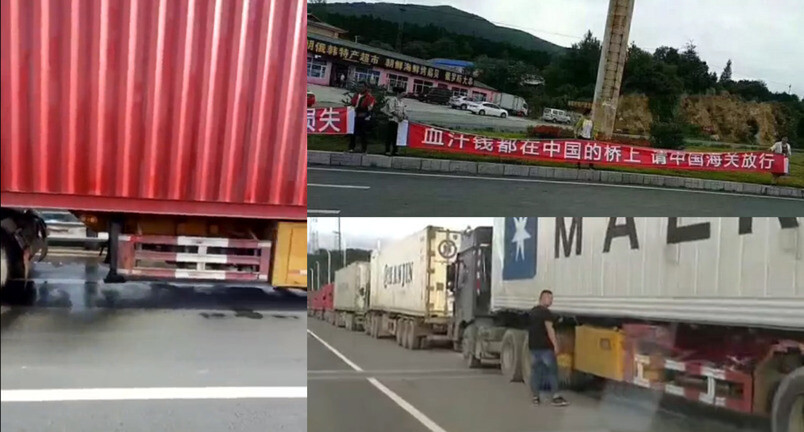hankyoreh
Links to other country sites 다른 나라 사이트 링크
Chinese merchants hit hard by North Korean seafood ban

In order to fulfill the new sanctions placed on North Korea by UN Security Council Resolution 2371, China banned seafood imports from North Korea starting on Aug. 15. There has been a great deal of resistance to the ban, including protests from merchants. The seafood supply in Beijing and other inland areas has sharply decreased.
Seafood wholesaler Feng Yalong said in an Aug. 18 interview with the South China Morning Post that when the supply was available, he would sell 1,500kg of North Korean shellfish a day in Beijing and Hebei province, but that the supply of shellfish coming over the border had all but dried up. “Today there was only 250kg,” he said.
Shellfish from North Korea cost about 20 yuan (about 3,400 won) more per kilogram than Chinese shellfish, but since about two years ago, more Chinese consumers have been requesting them, claiming that they are bigger and fresher. “It’s because there’s no pollution there [in North Korea] and you don’t even have to clean the seafood before you eat it,” Feng said. “All we can do is sell Chinese shellfish instead,” he continued. Last year, North Korea exported USD 190 million (217 billion won) worth of seafood to China.
Merchants in Hunchun, Jilin province, where marine products from the waters off North Korea’s east coast usually enter China, have been hit especially hard. On Aug. 16, some merchants held protests near the Quanhe Customs office, which are in charge of seafood imports from North Korea. Customs officers began refusing customs clearance for seafood on Aug. 15, even halting vehicles loaded with marine products on a bridge that crosses over the Tumen River, leading to the protests. “The premise is to put sanctions on North Korea, not to cause losses for Chinese citizens,” the merchants said.
Events unfolded as follows, according to a post on China’s SNS platform WeChat: At about 4pm on Aug. 14, the merchants heard that imports would be banned starting the following day, and they hurriedly began transport. At 5:30pm, customs officials on the North Korean side of the border finished work. On Aug. 15, work resumed as usual on the North Korean side and the vehicles were cleared through customs, but the imports were halted on the Chinese side. The huge loads of frozen seafood in the halted vehicles began to melt under the scorching summer sun, and, by Aug. 16, the area surrounding the Quanhe Customs office began to reek of rotting seafood.
Hunchun merchants are worried about their halted cargo clearing customs, but they are also upset about the cold storage and processing facilities they have built in North Korea. “Even just in squid alone, there must be thousands of tons. Hunchun’s Chinese merchants have already paid out for all of this, and it’s just sitting in cold storage in North Korea,” one merchant said.
By Kim Oi-hyun, Beijing correspondent
Please direct questions or comments to [english@hani.co.kr]

Editorial・opinion
![[Column] Has Korea, too, crossed the Rubicon on China? [Column] Has Korea, too, crossed the Rubicon on China?](https://flexible.img.hani.co.kr/flexible/normal/500/300/imgdb/original/2024/0419/9317135153409185.jpg) [Column] Has Korea, too, crossed the Rubicon on China?
[Column] Has Korea, too, crossed the Rubicon on China?![[Correspondent’s column] In Japan’s alliance with US, echoes of its past alliances with UK [Correspondent’s column] In Japan’s alliance with US, echoes of its past alliances with UK](https://flexible.img.hani.co.kr/flexible/normal/500/300/imgdb/original/2024/0419/2317135166563519.jpg) [Correspondent’s column] In Japan’s alliance with US, echoes of its past alliances with UK
[Correspondent’s column] In Japan’s alliance with US, echoes of its past alliances with UK- [Editorial] Does Yoon think the Korean public is wrong?
- [Editorial] As it bolsters its alliance with US, Japan must be accountable for past
- [Guest essay] Amending the Constitution is Yoon’s key to leaving office in public’s good graces
- [Editorial] 10 years on, lessons of Sewol tragedy must never be forgotten
- [Column] A death blow to Korea’s prosecutor politics
- [Correspondent’s column] The US and the end of Japanese pacifism
- [Guest essay] How Korea turned its trainee doctors into monsters
- [Guest essay] As someone who helped forge Seoul-Moscow ties, their status today troubles me
Most viewed articles
- 1[Column] The clock is ticking for Korea’s first lady
- 2Hong Se-hwa, voice for tolerance whose memoir of exile touched a chord, dies at 76
- 3After 2 months of delayed, denied medical care, Koreans worry worst may be yet to come
- 4[Column] Has Korea, too, crossed the Rubicon on China?
- 5Samsung barricades office as unionized workers strike for better conditions
- 6US overtakes China as Korea’s top export market, prompting trade sanction jitters
- 7All eyes on Xiaomi after it pulls off EV that Apple couldn’t
- 8[Guest essay] How Korea turned its trainee doctors into monsters
- 9[Editorial] As it bolsters its alliance with US, Japan must be accountable for past
- 10[Correspondent’s column] In Japan’s alliance with US, echoes of its past alliances with UK